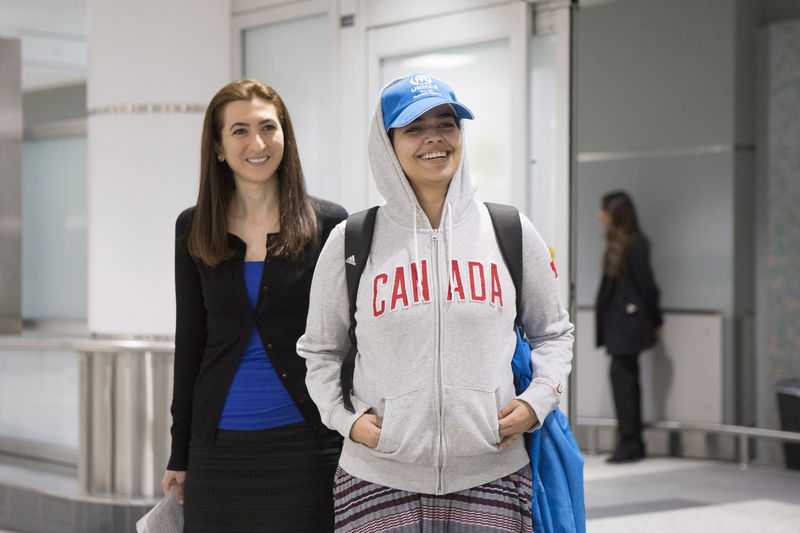Saudi teen refugee arrives in Toronto after week of drama
15 January, 2019

Tired but smiling, an 18-year-old Saudi woman who said she feared death if deported back home arrived Saturday in Canada, which offered her asylum in a case that attracted global attention after she mounted a social media campaign.
“This is Rahaf Alqunun, a very brave new Canadian,” Foreign Minister Chrystia Freeland said arm-in-arm with the Saudi woman in Toronto’s airport.
Rahaf Mohammed Alqunun smiled broadly as she exited an airport arrival door sporting a Canada zipper hoodie and a U.N. High Commissioner for Refugees hat, capping a dramatic week that saw her flee her family while visiting Kuwait and before flying to Bangkok. Once there, she barricaded herself in an airport hotel to avoid deportation and tweeted about her situation.
On Friday, Prime Minister Justin Trudeau announced that Canada would accept Alqunun as a refugee. Her situation has highlighted the cause of women’s rights in Saudi Arabia, where several women fleeing abuse by their families have been caught trying to seek asylum abroad in recent years and returned home.
Freeland said Alqunun preferred not to take questions Saturday.
“She is obviously very tired after a long journey and she preferred to go and get settled,” Freeland said. “But it was Rahaf’s choice to come out and say hello to Canadians. She wanted Canadians to see that she’s here, that she’s well and that she’s very happy to be in her new home.”
After arriving she was off to get winter clothes, said Mario Calla, executive director of COSTI Immigrant Services, which is helping her settle in temporary housing and applying for a health card.
Calla said Alqunun has friends in Toronto who she would be meeting up with this weekend.
“She did comment to me about the cold,” Freeland said.
“It does get warmer,” Freeland said she told her.
Alqunun flew to Toronto via Seoul, according to Thai immigration Police Chief Surachate Hakparn. Alqunun tweeted two pictures from her plane seat — one with what appears to be a glass of wine and her passport and another holding her passport while on the plane with the hashtag “I did it” and the emojis showing a plane, hearts and a wine glass.
Canada’s decision to grant her asylum could further upset the country’s relations with Saudi Arabia.
In August, Saudi Arabia expelled Canada’s ambassador to the kingdom and withdrew its own ambassador after Canada’s Foreign Ministry tweeted support for women’s right activists who had been arrested. The Saudis also sold Canadian investments and ordered their citizens studying in Canada to leave.
Freeland avoided an answer when asked what Alqunun’s case would mean to Saudi-Canadian relations.
There was no immediate Saudi government reaction, nor any mention of her arrival in state media. But a Saudi government-sanctioned body, the National Society for Human Rights, said it deplores the methods used by some foreign officials and organizations to “incite” some young Saudi females to disobey their families and leave the country.
In a statement late Saturday, the group’s director, Muftal al-Qahtani, slammed alleged political motives of some countries and said attempts to encourage these women to disobey their families leaves some vulnerable to abuse and trafficking, and harms families. Al-Qahtani insisted women facing abuse in the kingdom can turn to Saudi authorities and local organizations for assistance.
Freeland said that the U.N. refugee agency found Alqunun was in danger in Thailand and that Canada’s government is glad it was able to act quickly to offer her refuge.
Alqunun’s father arrived in Bangkok on Tuesday, but his daughter refused to meet with him.
Several other countries, including Australia, had been in talks with the U.N.’s refugee agency to accept Alqunun, Surachate said.
“She chose Canada. It’s her personal decision,” he said.
Australian media reported that UNHCR had withdrawn its referral for Alqunun to be resettled in Australia because Canberra was taking too long to decide on her asylum.
“When referring cases with specific vulnerabilities who need immediate resettlement, we attach great importance to the speed at which countries consider and process cases,” a UNHCR spokesperson in Bangkok told The Associated Press in an email reply on condition of anonymity because the person wasn’t authorized to discuss the case publicly.
